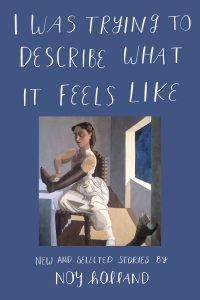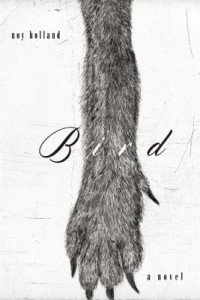Noy Holland
Noy Holland is the author of Bird: A Novel as well as three story collections, Swim for the Little One First, What Begins with Bird, and The Spectacle of the Body. Recipient of fellowships from the NEA, the MacDowell Colony and the Massachusetts Cultural Council, she teaches writing in the graduate program at the University of Massachusetts, Amherst.
Subscribe to our newsletter for news & events from Counterpoint Press.
Books
I Was Trying to Describe What it Feels Like
New and Selected Stories
"These new and selected stories testify to the fact that there are still fine short story writers out there, doing the hard job of serious literary production in our age of tweets and memes...Holland's language is challenging, elliptical, bristling with sensations and resounding with the interior lives of complicated, recognizable people." —The New York Times Book ReviewIn the twenty years since her first short story collection, The Spectacle of the Body, Noy Holland has become a singular presence in American writing. Her second and third collections, What Begins With Bird and Swim for the Little One First, secured her reputation as a writer who excels and excites, her prose described as unsettling and acutely wrought, rhythmic and lyrically condensed. Following the recent publication of Bird, her first novel, I Was Trying to Describe What It Feels Like is a gathering of stories, the majority of which have never before been published in book form. Set on two continents and ranging in length from a single page to a novella, these stories beguile and disrupt; they remind us of the reach of our compassion and of the dazzling possibilities of language.
"I Was Trying to Describe What it Feels Like," from which the collection takes its title, is part love song, part fever dream—a voice demanding the ecstatic. Holland's stories do not indulge in easy emotions, and they keep to the blessedly blurred frontier between poetry and prose.
Bird
A Novel
This is a novel about the persistence of longing in which the twin lives of the title character blur and overlap. Bird puts her child on the bus for school and passes the day with her baby. Interwoven into the passage of the day are phone calls from a promiscuous, unmarried friend, and Bird's recollection of the feral, reckless love she knew as a young woman. It's a day infused with fear and longing, an exploration of the ways the past shapes and dislodges the present.In the present moment, Bird dutifully cares for her husband, infant, older child. But at the same time Bird inhabits this rehabilitated domestic life, she re–lives an unshakeable passion: Mickey, the lover she returns to with what feels like a migratory impulse, Mickey, whose movements and current lovers she still tracks. With Mickey, she slummed and wandered—part–time junkie, tourist of the low–life—a life of tantalizing peril. This can't last, Bird thought, and it was true.
Noy Holland's writing is lyrical, fired by a heightened eroticism in which every sight and auditory sensation is charged with arousal. The writing in this book – Noy Holland's first novel –– is fearless in its depiction of sexual appetite and obsessive love. It sheds light on the terror of abandonment and the terrible knowledge that we are helpless to protect not only ourselves but the people we most love.

Catapult | Counterpoint | Soft Skull
1140 Broadway #706
New York, NY 10001
646.926.0805 | info@counterpointpress.com






